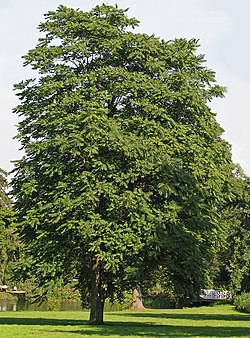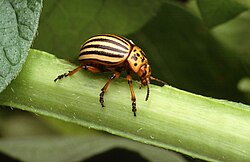The western conifer seed bug (Leptoglossus occidentalis), sometimes abbreviated as WCSB, is a species of true bug (Hemiptera) in the family Coreidae....
13 KB (1,487 words) - 08:42, 8 March 2025
Leptoglossus phyllopus (redirect from Eastern leaf-footed bug)
leaf-footed bug is a species of leaf-footed bugs in the same genus as the western conifer seed bug (L. occidentalis). The eastern leaf-footed bug is found...
5 KB (419 words) - 04:07, 17 April 2025
Leptoglossus occidentalis, the "western conifer seed bug" This disambiguation page lists articles associated with the title Seed bug. If an internal link led...
837 bytes (97 words) - 09:24, 19 May 2024
Stone pine (category Edible nuts and seeds)
brought the seeds with them from France. The tree is known in the Afrikaans language as kroonden. The introduced Western conifer seed bug (Leptoglossus...
16 KB (1,743 words) - 18:14, 3 June 2025
coniferous seeds has caused a reported 83% decrease in lodgepole pine seeds, making L. occidentalis an economic pest. The western conifer seed bug, Leptoglossus...
15 KB (1,206 words) - 05:10, 23 May 2025
the western conifer seed bug, a true bug species native to California, Oregon and Nevada, United States Leptotyphlops occidentalis, the Western thread...
685 bytes (109 words) - 04:35, 8 July 2019
hirsutus, Eusilpha jakowlewi, Dryophilocoris kerzhneri, bean bug, western conifer seed bug, marsh rhopalid, Deraeocoris salicis, Oriental beetle, black...
60 KB (4,191 words) - 04:42, 1 June 2025
station ("Cambridge school of Broadcasting") Western Canadian Sedimentary Basin Western conifer seed bug This disambiguation page lists articles associated...
354 bytes (74 words) - 16:19, 5 May 2025
by the mouthparts of plant-feeding insects; in particular, the Western conifer seed bug (Leptoglossus occidentalis) is known to sometimes pierce through...
55 KB (7,015 words) - 02:42, 10 May 2025
Idaho and western Montana. Western tanagers had higher densities in mature (33 ft, >10 m tall) conifer plots and young conifer/mature conifer transition...
47 KB (5,340 words) - 00:56, 4 June 2025
mosquitoes, ants, house flies, and grasshoppers are common, as is the Western conifer seed bug, and several kinds of butterflies and moths (for example, monarch...
174 KB (17,101 words) - 23:03, 19 May 2025
cigarette beetle and the drugstore beetle. These pests are known to infest “seeds, nuts, grains, spices, dried fruits, and vegetables," items which many museums...
42 KB (3,906 words) - 23:24, 3 June 2025
Black-headed grosbeak (category Native birds of Western Canada)
The black-headed grosbeak (Pheucticus melanocephalus) is a medium-sized, seed-eating bird in the family Cardinalidae. It is sometimes considered conspecific...
19 KB (1,324 words) - 17:14, 13 January 2025
Scutelleridae (redirect from Jewel bug)
Scutelleridae is a family of true bugs. They are commonly known as jewel (stink) bugs or metallic shield bugs due to their often brilliant coloration...
31 KB (2,840 words) - 03:31, 13 May 2025
Pentatomidae (redirect from Shield bug)
insects belonging to the order Hemiptera, generally called shield bugs or stink bugs. Pentatomidae is the largest family in the superfamily Pentatomoidea...
25 KB (2,251 words) - 06:55, 2 June 2025
Pinyon pine (category Edible nuts and seeds)
collect the pinyon seeds for personal use or for commercialization. The pinyon nut or seed is high in fats and calories. In the western United States, pinyon...
14 KB (1,571 words) - 04:50, 1 June 2025
commonly flies, that then carry the oval-shaped pollen on them. The Welwitschia bug, Probergrothius angolensis, is commonly observed on the plant, but likely...
22 KB (2,343 words) - 04:43, 5 June 2025
Megarididae (category Shield bugs)
Megarididae is a family of true bugs in the superfamily Pentatomoidea. The family consists of a single extant genus Megaris with about 16 species restricted...
2 KB (266 words) - 06:50, 14 May 2025
up to 44.8 m³ within the park, making it the largest eastern evergreen conifer, eclipsing in volume both eastern white pine (Pinus strobus) and loblolly...
26 KB (3,420 words) - 00:53, 24 May 2025
insects in the order Hemiptera (true bugs). They are in the suborder Auchenorrhyncha, along with smaller jumping bugs such as leafhoppers and froghoppers...
76 KB (8,009 words) - 06:13, 12 May 2025
Paleobiota of the Morrison Formation (category Fauna of the Western United States)
ferns, seed ferns, and a wealth of gymnosperms—such as cycads, ginkgos, and conifers. Vegetation varied from river-lining forests of conifers, tree ferns...
58 KB (3,168 words) - 23:11, 4 June 2025
either lethal or highly damaging to 11 North American hardwoods and 34 conifers, with the white ash (Fraxinus americana) being the only plant not adversely...
83 KB (8,881 words) - 20:39, 1 June 2025
Colorado potato beetle (redirect from Colorado bug)
beetle, the ten-striped spearman, the ten-lined potato beetle, and the potato bug) is a beetle known for being a major pest of potato crops. It is about 10 mm...
67 KB (7,444 words) - 20:11, 22 May 2025
that trap insects. Roridula does not break down the insect proteins, but bugs of the genus Pameridea prey on the trapped insects. These later deposit their...
19 KB (2,112 words) - 00:58, 9 May 2025
Notonecta of the world. U. Kansas Sci. Bull. 21: 5-195.6+516+2kkig Painful bug bite, Williams 1980, Hawking & Smith 1997 [dead link] Notonectidae, Australian...
6 KB (624 words) - 21:50, 23 May 2025
Los Rastros Formation (section Seed ferns)
(cockroaches and kin), coleopterans (beetles and kin), or hemipterans (true bugs). Among Triassic formations of South America, the Los Rastros Formation's...
38 KB (1,688 words) - 19:42, 22 May 2025
Their closest relatives are the jumping plant lice, whiteflies, phylloxera bugs and aphids. The majority of female scale insects remain in one place as adults...
46 KB (4,763 words) - 22:08, 29 May 2025























